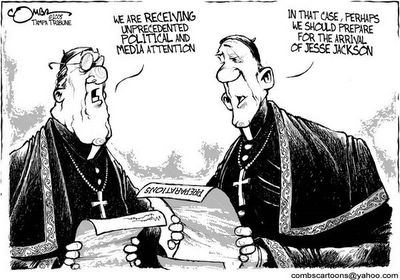Reading beyond the executive summary reveals that the intelligence failure on Iraq had little to do with management, interagency disputes, or sloppy organizational charts. Rather, the main causes were twofold. First, on many points, well-placed intelligence analysts were simply wrong; it's as plain as that, and it's hard to see how any reshufflings or new directives might have overwhelmed human fallacy. Second, everyone knew President Bush was gearing up for war; he, therefore, wanted, needed, to find Iraq worthy of invasion; and the heads of intelligence, doubling as administration appointees, accommodated that disposition.
The commissioners try to skirt this political dimension of the intelligence analysts' findings. "In no instance," the report states up front, "did political pressure cause them to skew or alter any of their analytical judgment." However, it goes on, "That said, it is hard to deny the conclusion that intelligence agencies worked in an environment that did not encourage skepticism about the conventional wisdom."
Later on, the report elaborates: "Some analysts were affected by this 'conventional wisdom' and the sense that challenges to it—or even refusals to find its confirmation—would not be welcome." This "climate" was shaped, the report continues, by a "gathering conviction among analysts that war with Iraq was inevitable."
The report also notes an inherent conflict. The director of the intelligence community must be close to the president in order to have influence, but this means he risks a "loss of objectivity," as the director then becomes "part of the team." As a result, intelligence analysts "may be dissuaded from offering dissenting opinions."
One reason the commissioners address this point so briefly, and obliquely, is that President Bush didn't want them to bring it up at all. As Lawrence Silberman, the panel's co-chairman, explained at the press conference this morning, "Our executive order did not direct us to deal with the use of intelligence by policymakers, and all of us agreed that this was not part of our inquiry."
...
Another source of error is that intelligence analysts assumed Saddam Hussein was developing weapons of mass destruction, especially biological and chemical weapons. He'd acquired them before; U.S. analysts had underestimated his capabilities the first time around, before the 1991 Gulf War; therefore, the report states, evidence from 2001-03 was viewed "through the prism of their assumption that Iraq was reconstituting" its WMD, resulting in a "tunnel vision."
This is an insightful observation, but what can anybody do with it? We all view evidence through the prism of some assumptions. That's the nature of human perception and cognition. If we didn't, we would experience the world as random sensory stimuli.
As one way to deal with this natural tendency, the report suggests the cultivation of "competitive intelligence analysis." Special groups should be set up to interpret intelligence data in ways that are "explicitly contrarian" and "licensed to be troublesome." This sort of enterprise works well in certain contexts. For instance, war-game exercises pit a blue team against a red team, so that war plans can be tested against at least the simulacrum of an enemy. But an institutionalized red team in intelligence analysis would come to be viewed as a formality to be tolerated, then sidestepped. When President Lyndon Johnson held Cabinet meetings on the Vietnam War, he always invited George Ball, a State Department official who famously opposed the war, so all the officials could say they listened to a dissenting view. Ball otherwise had no effect on their thinking. **
...
The report does make a few suggestions that are sensible, practical, and nearly cost-free. The most intriguing and significant is the idea of forcing intelligence agencies to make clear—to the president and other policymakers—how much of their analysis is based on solid data and how much on assumptions and inferences. Too often, these distinctions were left out of intelligence estimates on Iraq—or buried so deeply in the report that they weren't noticed by officials too busy to read more than the summary.
>> Full Article [Slate Magazine "Military Analysis"]

















